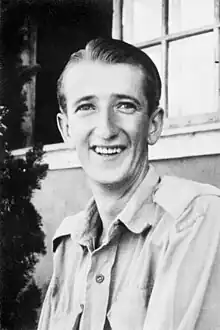Bill Madden (soldier)
Horace William Madden, GC (14 February 1924 – 6 November 1951), also known as Bill Madden, was a soldier in the Australian Army who was a posthumous recipient of the George Cross for his defiance while a prisoner during the Korean War.
Horace William Madden | |
|---|---|
 Horace Madden, 1947 | |
| Nickname(s) | "Bill", "Slim" |
| Born | 14 February 1924 Cronulla, Australia |
| Died | late November/early December 1951 (aged 27) Kangdong, Korea |
| Buried | |
| Allegiance | Australia |
| Service/ | Australian Army |
| Years of service | 1942–47 1950–51 |
| Rank | Private |
| Battles/wars | Second World War |
| Awards | George Cross |
Early life
Horace William Madden was born in Cronulla, a suburb of Sydney, on 14 February 1924 to Australian-born parents. He was working as a fruiterer's assistant when he was called up for the Australian Citizens Military Forces (CMF), the militia, in May 1942.[1]
Military career
Madden was initially posted to the 114th Australian General Hospital in Goulburn, New South Wales.[1] As part of the CMF, he was not required to serve outside of Australia or its territories, but despite this he transferred to the Australian Imperial Force in August 1943. Nicknamed 'Slim' due to his lean build, Madden saw service with the 8th Field Ambulance in New Guinea, during which he contracted malaria.[2] He later served with the 5th Motor Ambulance Convoy Platoon on Bougainville and was part of the British Commonwealth Occupation Force in Japan after the war. He was eventually discharged from the army in June 1947.[1]
After leaving the army, Madden took up work at a mental hospital. Two months after the Korean War broke out, he reenlisted with the Australian Army for service as a private in Korea. Initially assigned to 3rd Battalion, Royal Australian Regiment (3 RAR) for duty as a driver, he later volunteered for signalling duties.[1]
In April 1951, the Chinese attacked the regiment's positions near Kapyong in what would be known as the Battle of Kapyong. Madden was among three Australian soldiers captured during the battle. During captivity, he demonstrated strong defiance to his captors. His defiant conduct, observed by many of the other prisoners and which would eventually see him nominated for the George Cross, was maintained despite beatings and other punishments such as extreme rationing of his food. His ill treatment eventually resulted in his death from malnutrition sometime in late November or December 1951 at age 27.[2]
Madden was posthumously awarded the George Cross for his conduct as a prisoner of war, which set an example for his fellow captives.[2]
George Cross Citation
St. James's Palace, S.W.1. 30th December, 1955.
The QUEEN has been graciously pleased, on the advice of Her Majesty's Australian Ministers, to approve the posthumous award of the GEORGE CROSS, in recognition of gallant and distinguished service whilst a prisoner of war in Korea, to:—
2/400186 Private Horace William MADDEN (deceased) 3rd Battalion, Royal Australian Regiment.
Private Madden was captured by Chinese Communist Forces on 24th April, 1951, near Kapyong. He was a signaller attached to Battalion Headquarters at the time and received concussion prior to capture.
Private Madden was held prisoner by the enemy until about 6th November, 1951, when he died of malnutrition and the result of ill-treatment. During this period he openly resisted all enemy efforts to force him to collaborate, to such a degree that his name and example were widely known through the various groups of prisoners. Testimonials have been provided by Officers and men from many units of the Commonwealth and Allied Forces which show that the heroism he displayed was quite outstanding.
Despite repeated beatings and many other forms of ill-treatment inflicted because of his defiance to his captors, Private Madden remained cheerful and optimistic. Although deprived of food because of his behaviour, resulting in severe malnutrition, he was known to share his meagre supplies purchased from Koreans with other prisoners who were sick.
It would have been apparent to Private Madden that to pursue this course must eventually result in his death. This did not deter him, and for over six months, although becoming progressively weaker, he remained undaunted in his resistance. He would in no way co-operate with the enemy. This gallant soldier's outstanding heroism was an inspiration to all his fellow prisoners.[3]
The George Cross was presented to his sister on 9 May 1956 by the Governor of New South Wales, Lieutenant General Sir John Northcott.[4] Madden's body was recovered following the armistice that saw an end to the war and was subsequently buried in the United Nations Memorial Cemetery at Busan, South Korea.[1]
3 RAR's Other Rank's (OR's) canteen, located within their barracks, is officially named the "Madden Club" after Bill Madden.[5]
Notes
- Greville, 2000
- Ashcroft, 2010, pp.249 – 251
- "No. 40665". The London Gazette (Supplement). 27 December 1955. p. 7299.
- "Hero of Korean War Awarded George Cross". The Canberra Times. 10 May 1956. Retrieved 4 November 2020.
- "ABN Lookup -3 RAR Madden Club". abr.business.gov.au. 1 November 2014. Retrieved 18 June 2019.
References
- Ashcroft, Michael (2010). George Cross Heroes. London, United Kingdom: Headline Publishing. ISBN 978-0-7553-6082-6.
- Greville, P. J (2000). Madden, Horace William (Slim) (1924–1951). Retrieved 3 April 2012.
{{cite book}}:|work=ignored (help)